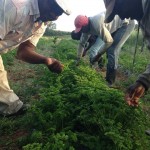Gender inequality contributes to different experiences throughout our food system, from production to purchasing.
Women are part of the changing face of farming in Canada. But a recent report indicates that 61% of women perceive, or have experienced, gender-based discrimination.
Women also report lower earnings, less access to financing and lower rates of land ownership than their male counterparts.
And the differences related to gender and food don’t stop on the farm. One-third of households led by a single female parent are food insecure, compared to the Canadian average of 1 in 8.
Work in food service also drives the gap. Food services is a fast-growing Canadian industry with a high share of female workers. Low-pay, part-time work and job precarity in this sector contribute to lower earnings, which in turn contribute to an inability to meet household food needs.
But food also presents an opportunity to help close the gender gap. In Canada, there is growing momentum around several policies that set out to improve food access in our country using Gender-based analysis.
Gender Based Analysis, or GBA, is a tool to minimize the negative impacts a policy may have on gender equality, and to consider the types of policies that may be needed to ensure equitable outcomes.
The difference between equality and equity is an important one. Equality focuses on treating everyone the same, while equity has the goal of providing everyone with the resources they need to get to the same outcome.

GBA+ considers how intersecting factors such as ethnicity, socio-economic status, age and ability may amplify the differing ways that women, men and gender-diverse people experience policies, programs and initiatives.
GBA+ can help us improve food policy through analysis of how our policy responses may help, or harm, efforts at promoting gender equality.
One local example of this is Speak Up 4 School Food, an online campaign advocating for federal investment in a universal healthy school food program. Advocates have applied a gender lens to highlight the role that women play in the school food workforce, and the need for stable, adequate funding not only nutritious food, but to ensure good jobs for the workers who prepare it.
Basic income is another hot topic, with many cities using basic income as a new policy approach to reducing poverty. A guaranteed income responds to household food insecurity by ensuring that people have the income they need to buy food.
GBA+ raises how a basic income would make significant strides towards tackling gender-based income inequalities in the most marginalized communities.
March 8th marks International Women’s Day, an opportunity to reflect on our progress in achieving equality for girls and women.
The 2019 UN Theme – “Think equal, build smart, innovate for change” – inspires us to consider how we can advance gender equality through our efforts to transform communities through food.
Do you know of any great examples of how communities are advancing gender equlity through food or food policy? We’d love to hear about it in the comments!
Blog written by: Rebecca Hasdell, Food Policy Fellow, Ecology Action Centre and Dalhousie University and Satya Ramen, Senior Coordinator, Our Food Project, Ecology Action Centre
Adventures in Local Food is your source for food news in Nova Scotia, from pickles to policy. It is a project organized by the Ecology Action Centre. Learn more about our program at https://www.ecologyaction.ca/ourfood
Or follow us on:
Twitter: @OurFoodProject and @EcologyAction
Facebook: The Ecology Action Centre
Instagram: ecologyaction



